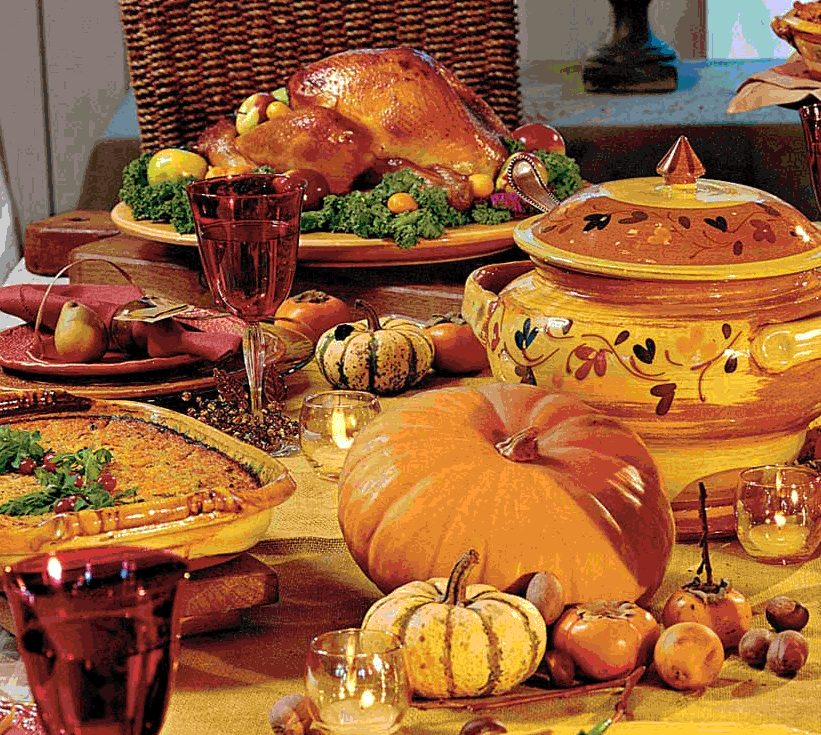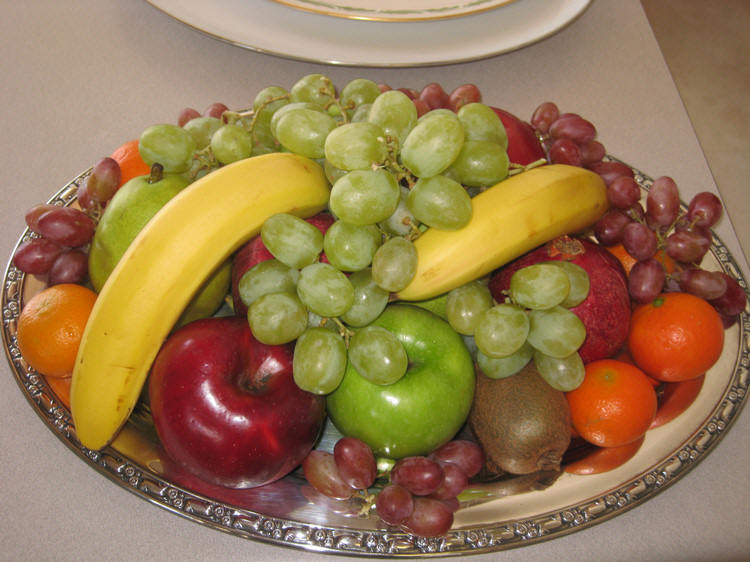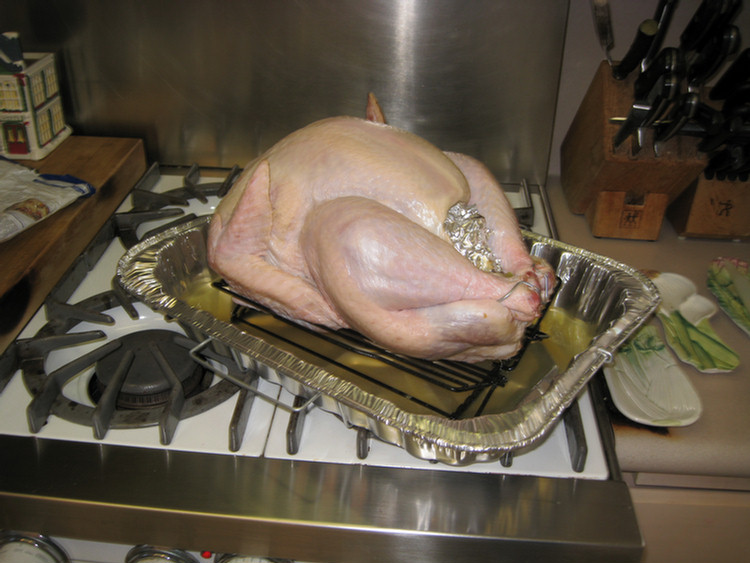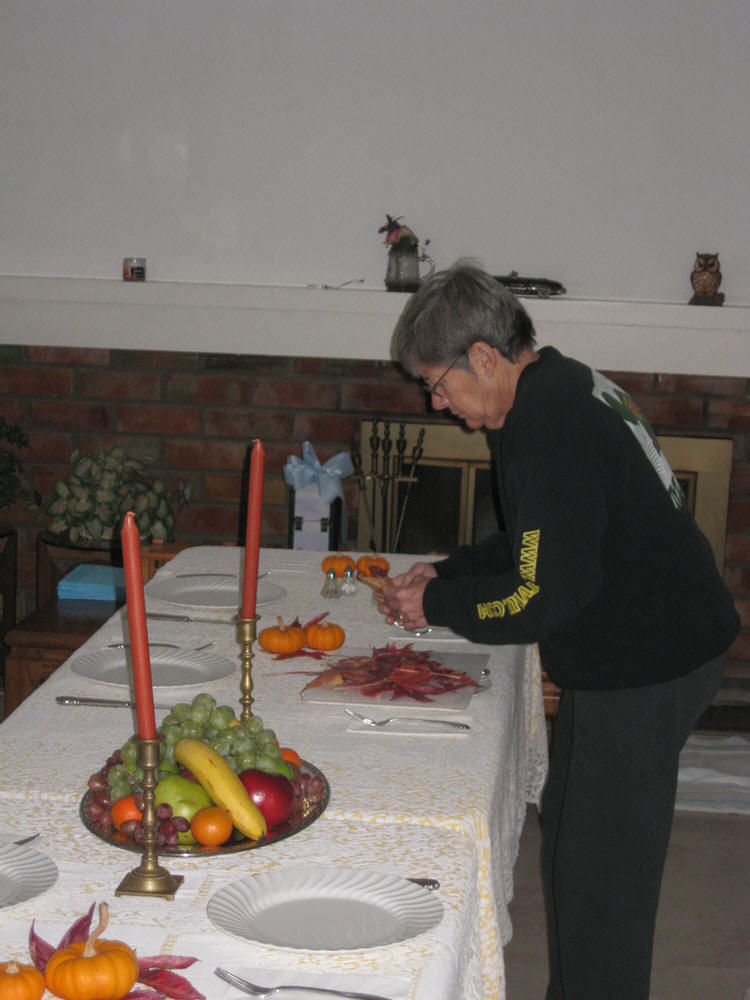Thanksgiving 2009 Is A Happy Family Time (Page One)
Page Created: 11/26/2009 Page Last Updated: 11/21/2025 11:15
While dancing the night away last weekend, the cell phone went off and guess what.... Carri is flying in for the week to make the party even more fun!! See the Wild Turkeys !
So our guest list is: Jeanette, Joseph, Connor, Robin, Bob, Nick, Carri, and Dave

Let's Eat!!!
Preparations are Underway!
It's Monday and we are off to the market's to capture a turkey and other delights for the feast! We are off to Bristol Farms first! since we are only having 10 people, we got a puny, emaciated, tiny, small 18 pound turkey.

Thanksgiving morning and Sue hits the ground running

The fruit tray is a beautiful tradition with grapes and tangerines coming from
our yard. We would have had apples from our yard but they went into the apple sauce

Mr. Puny before
Did You Know? - A turkey is either of two living species of large birds in the genus Meleagris. One species, Meleagris gallopavo, commonly known as the Wild Turkey, is native to the forests of North America. The other species, Meleagris ocellata, known as the Ocellated Turkey, is native to the forests of the Yucatán Peninsula.
The domestic turkey is a descendant of the Wild Turkey and features prominently in the menu of the Canadian and U.S. holidays of Thanksgiving and that of Christmas in many countries.
Turkeys are classed in the taxonomic order of Galliformes. Within this order they are relatives of the family/subfamily Tetraonidae (grouse). Turkeys have a distinctive fleshy wattle that hangs from the underside of the beak, and a fleshy protuberance that hangs from the top of its beak called a snood. With wingspans of 1.5–1.8 metres (4.9–5.9 ft), the turkeys are by far the largest birds in the open forests in which they live. As with many Galliform species the female (hen) is smaller than the male (tom or gobbler) and is much less colorful.

Jeanette's birthday was on the 24th so her favorite pie had
to be decorated
Did You Know? - A mince pie (sometimes also minced, minced meat, or mincemeat pie) is a British festive sweet pastry, traditionally consumed during the Christmas and New Year period. Mince pies normally have a pastry top, but versions may also be found without the top in which case they are known as mince tarts. Mince pies are filled with mincemeat – a preserve typically containing apple, dried fruits such as raisins and sultanas, spices, and either suet or vegetable shortening.
Modern mince pies typically do not contain any meat, but because suet is raw beef or mutton fat, mince pies made with suet are not suitable for vegetarians. Individual mince pies are usually 6–7.5 cm (2.5-3 inches) in diameter, although larger mince pies, suitable for slicing, may also be baked.

These are products of our backyard

The bird be stuffed!

We cook most of the stuffing outside the bird so Sue can enjoy it
Time To Decorate The Table

We went gathering down the street

Droopy Drawers looks for the perfect leaves

"Ah... perfect!"

Ready to be pick

Bags full time to go home
Did you know? - Acer is a genus of trees or shrubs commonly known as Maple.
Maples are variously classified in a family of their own, the Aceraceae, or together with the Hippocastanaceae included in the family Sapindaceae. Modern classifications, including the Angiosperm Phylogeny Group system, favour inclusion in Sapindaceae. The type species of the genus is Acer pseudoplatanus (Sycamore Maple).
There are approximately 125 species, most of which are native to Asia,[citation needed], with a number also appearing in Europe, northern Africa, and North America.
The word Acer is derived from a Latin word meaning "sharp", referring to the characteristic points on maple leaves. It was first applied to the genus by the French botanist Joseph Pitton de Tournefort in 1700. A red maple leaf is the prominent feature of the flag of Canada.
Back To The Kitchen

Pumpkin fondue in the making!
Did you know? - A recipe for a sauce made from Pramnos wine, grated goat's cheese and white flour appears in Scroll 11 (lines 629-645) of Homer's Iliad and has been cited as the earliest record of a fondue.
Modern fondue originated during the 18th century in the canton of Neuchâtel. As Switzerland industrialized, wine and cheese producers encouraged the dish's popularity. By the 20th century many Swiss cantons and even towns had their own local varieties and recipes based on locally available cheeses, wines and other ingredients. During the 1950s a slowing cheese industry in Switzerland widely promoted fondue since one person could easily eat half a pound of melted cheese in one sitting. In 1955, the first pre-mixed "instant" fondue was brought to market. Fondue became popular in the United States during the mid-1960s after American tourists discovered it in Switzerland.

The automated potato peeler in action
Did you know? - Wild potato species occur from the United States to Uruguay and Peru. Genetic testing of the wide variety of cultivars and wild species suggest that the potato has a single origin in the area of southern Peru, from a species in the Solanum brevicaule complex. Although Peru is essentially the birthplace of the potato, today over 99% of all cultivated potatoes worldwide are descendants of a subspecies indigenous to south-central Chile.

The leaves are being deployed to the table as decoration

Basting the turkey
Did you know? - Basting is a cooking technique, and usually involves cooking meat with either its own juices or some type of preparation such as a sauce or marinade. The meat is left to cook, then is periodically coated with the juice or as it cooks. Prominently used in grilling, rotisserie, roasting and other meat preparations where the meat is over heat for extended periods of time, basting can flavor the meat and keep it moist. However, basting can in some cases actually lead to drying. Since the oven door must be opened several times during cooking, which leads to a decrease in oven temperature, the cooking time must be extended, and the juices may not be well enough absorbed to overcome the drying that this causes


"Don't look, this is difficult for me already!"

What A Wonderful Surprise!!!

Pete called from Iraq!

It was 34 degrees and about to snow in the desert of Iraq.
It was 1:00 here and 11:00 there the next day

Sue take a break before getting ready

The babies have been working hard all afternoon

Sarge is tuckered out
Did You Know? - It will come as no surprise that 'tuckered out' is an American phrase. No 'B-feature' western from the 1930s and 1940s was complete without Gabby Hayes being 'plumb tuckered out'. Hayes' contribution to the genre was celebrated by Mel Brooks in the 1974 film Blazing Saddles. In that, a look-alike actor played the part of Gabby Johnson, spouting 'authentic frontier gibberish' - "dad gum it, I am gonna die here an' no sidewindin bushwackin, hornswaglin, cracker croaker is gonna rouin me biscuit cutter".
 'Plumb' is just an intensifier. 'Tuckered out' is rarely seen alone. People are 'plumb', 'clear', 'well-nigh' or, as in the earliest example that I've found, 'prodigiously', 'tuckered out'. That example is from the Wisconsin Enquirer, April 1839:
'Plumb' is just an intensifier. 'Tuckered out' is rarely seen alone. People are 'plumb', 'clear', 'well-nigh' or, as in the earliest example that I've found, 'prodigiously', 'tuckered out'. That example is from the Wisconsin Enquirer, April 1839:
"I reckoned to have got to the tavern by sundown, but I haven't - as I'm prodigiously tuckered out."

"I think I need another short nappy!"

Stuffing the punkins with bread, cheese, broth and spices

We needed two pots for the potatoes

Polished up and ready for the oven

Their two brothers ended up as decoration
